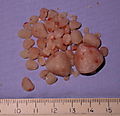 This is Missy May. She's a pretty good little dog, pretty healthy aside from an occasional mild allergic flare-up. She came in yesterday because of urinary problems. She had been squatting and straining pretty frequently for the last couple of weeks, and now she has had some "accidents" in the house. Her owner very thoughtfully managed to bring a little urine specimen for us. It was full of white blood cells, which is never normal.
This is Missy May. She's a pretty good little dog, pretty healthy aside from an occasional mild allergic flare-up. She came in yesterday because of urinary problems. She had been squatting and straining pretty frequently for the last couple of weeks, and now she has had some "accidents" in the house. Her owner very thoughtfully managed to bring a little urine specimen for us. It was full of white blood cells, which is never normal.
Dogs with bladder problems usually keep emptying the bladder as often as possible, trying to relieve their irritation. This makes it hard to catch them with a full bladder, so you may not get much of a picture with the ultrasound (works better with a full bladder; fluid is your friend with ultrasound).
 So we took an X-ray. There's a lot of stuff on the radiograph, stool in the colon, and so forth, but the area outlined in red is her urinary bladder. It is full of stones, dozens of them (cystic calculi for you scientific types). Whoa, those didn't all just magically form in the last two weeks.
So we took an X-ray. There's a lot of stuff on the radiograph, stool in the colon, and so forth, but the area outlined in red is her urinary bladder. It is full of stones, dozens of them (cystic calculi for you scientific types). Whoa, those didn't all just magically form in the last two weeks.
"It's funny, " I said to Missy's owner,"but I often see these dogs who have lots of stones, or big stones, and the people just noticed outward signs in the last couple of days. You know that they must have been there a long time, as big as some of them are. Yet, up until just lately nobody noticed a thing, and now the dog is squatting and straining and just producing tiny amounts of urine. Missy May must have had those stones for longer than three weeks."
"Don't you remember, Doctor? I mentioned at her checkup [in JULY] that she was urinating more frequently?" Dang! No, I didn't remember that. I looked at her chart, and there it is: Owner feels that the dog is urinating more frequently, not necessarily more volume, no increase in water intake, no accidents in the house.
Lots of older dogs have increased urine output, no big deal, but it would have been a good idea to worrk it up. I apparently got caught up in the rest of her visit, mentally put this on the back-burner, where it sat until it caught the kitchen on fire. Jeez.
 Were there any stones then? Don't know. I'll bet there was a bladder infection, though. These stones sure look like struvite (we don't have the analysis back yet). Struvite stones in dogs are considered ALWAYS to be secondary to a bladder infection.
Were there any stones then? Don't know. I'll bet there was a bladder infection, though. These stones sure look like struvite (we don't have the analysis back yet). Struvite stones in dogs are considered ALWAYS to be secondary to a bladder infection.
Treatment would probably have been exactly the same back then, but the dog would not have had as long a period of discomfort.
The Take-Home Message: If you feel like your problem has not been handled, don't be bashful about reminding me. Beat on me to get my attention, if you have to. Just because I handled two other problems doesn't mean it's okay to skip one.

